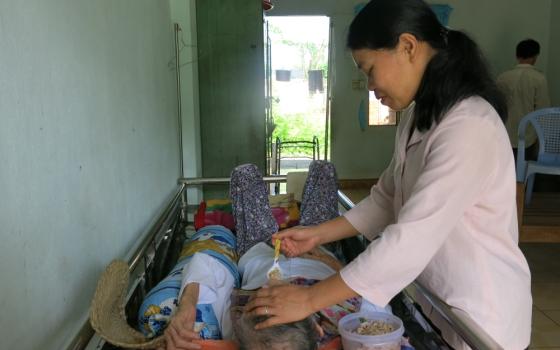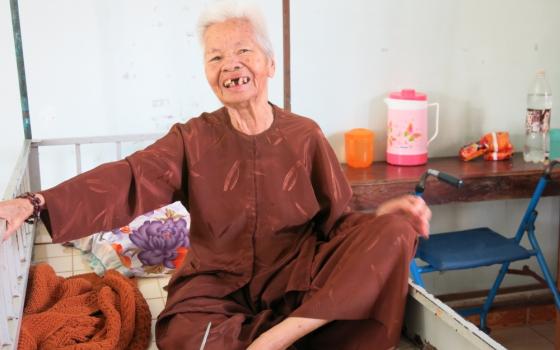Tuoi Tre Newspapers reported that Tran Thi Tu, 78, was found dead Jan. 5, lying on a collapsible chair in her house in Tien Giang province, southern Vietnam, three weeks after villagers discovered a foul odor coming from her house.
Tu had been left alone in the little house built by the government and lived on a social security allowance of 180,000 dong (U.S. $8.50) a month. Her only nephew had a miserable relationship with her and had abandoned her.
Other elderly women in similar situations, however, are much luckier, thanks to the nuns of the Mater Pieta congregation, which is dedicated to care for homeless elderly women in the area. Its members offer free accommodation, food, medicine and spiritual care to 65 such women at their three centers in Ho Chi Minh City and two neighboring provinces.
Sr. Anna Do Thi Kim Phuong, who is a nurse and head of St. Vincent Rest Home based in Tay Ninh province, said her center is home to 20 women, aged 45-100, who are served by four nuns. Some of the women are blind, deaf or bedridden, and others suffer mental disorders. Many are illiterate and have no personal papers.
Most of them are single, are orphans or have lost their relatives in wars and natural disasters. Many used to work as housemaids, beggars or collectors of used items in order to eke out a living. Parish priests and nuns who encounter such women introduce them to the Mater Pieta sisters for help.
Phuong said she recently admitted a 92-year-old woman who had a poor relationship with her daughter-in-law and had resorted to walking around on streets at night to escape the bad environment.
At St. Vincent every day, the nuns serve them food they like, bathe them, wash their clothes, give them health care and provide company. They currently hand-feed seven women who are bedridden. They also care for the dying, give them last rites and bury them in a nearby cemetery.
The elderly women at the centers recite the rosary and pray for themselves, their benefactors and the sisters. They enjoy friendly chats with one another and laugh heartily at their own jokes. Some who are healthy enough for hobbies look after dogs, cats and fish, or take care of flowering plants and bonsai trees around the house.
Most of the women GSR interviewed said they hoped to spend the rest of their lives in care at the centers. “We are happy to live here. We want to live here until death,” said Nguyen Thi Truc, a 70-year-old St. Vincent resident.
Phuong said her congregation focuses on only elderly women because it is inconvenient for nuns to bathe and perform other tasks that elderly men would require.
“Our ministry is to serve elderly women without relatives and homes and those abandoned by their children,” Phuong said. “We create favorable conditions for them to live a peaceful and proper life and to die with dignity, because they suffered terribly when they were young.”
Family members in Vietnam usually care for their elderly relatives, but older people who are estranged or without close family can struggle mightily.
And the population is aging fast. The Vietnam National Committee on Aging estimated that the proportion of people 60 or older is expected to increase from 10 percent of its population of 90 million in 2014 to 26 percent of about 124 million people by 2050.
Seventy to 80 percent of the elderly have to do manual work for their own living or rely on their children’s support and care. In general they each suffer from an average of two or three chronic diseases and spend 15 years of their life in ill health, according to government records.
Elderly women by far outnumber elderly men: By age 65, there are two women per one man; by age 70, 2.5 women per one man, and at 85, three women per one man.
Some families have offered to pay fees to the care centers where their elderly mothers are, but the nuns declined.
“Children should care for their parents when they get old as their filial duty in national tradition,” Phuong said.
On the other hand, she said local people also offer elderly women money and food and, in return, ask them to pray for their health and work. The center brings these people together, she added. The ministry is also financed from monthly government payments of 200,000 dong (U.S. $10) made to women 80 or older, and the order covers the remainder of costs.
Phuong said her work was inspired by a film on Blessed Teresa of Calcutta, commonly known as Mother Teresa, who cared for abandoned patients in India.
Sr. Teresa Hoang Thi Ngoc, superior of the Mater Pieta congregation founded by the late Fr. Peter Phan Danh Duy in 1986, said the order aims to look after bodies and souls of elderly people before their death.
She said they gather homeless women and those living at garbage dumps and markets, but also welcome terminally ill patients from hospitals.
In addition, Ngoc said, the congregation’s 100 members take care of 70 disabled children and provide basic education to children in remote areas. They cultivate coffee and rubber trees and operate kindergartens to support the congregation’s work.
Ngoc says of the mission to care for abandoned elderly women, “We are pleased with our ministry because we do not know how bereft those women's lives might be without our service. Every person must be given opportunities to live with dignity.”
[Joachim Pham is a correspondent for Global Sisters Report, based in Vietnam.]



